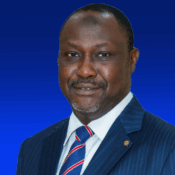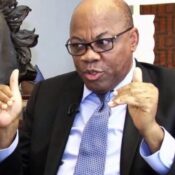
Resources: The DRC’s conflict between development and conservation
For the great majority of Congolese people, nature protection is a notion that means relatively little, while being one of the planet’s most pressing challenges.
The possibility of oil exploitation in some protected areas has come up for discussion in the Democratic Republic of the Congo in the lead-up to July 28, International Day for Nature Conservation.
The project has not drawn any significant bids for the exploitation of gas and oil blocks more than a year after invitations to tender were sent out, but the government is persevering in spite of demands from environmentalists to postpone the plans.
The environment minister, Eve Bazaïba, argues in favor of the fossil fuel extraction proposal, stating that those opposed must offer substitutes for Kinshasa’s pursuit of socioeconomic advancement.
As one of the biggest carbon sinks in the world, the DRC has been attempting to gain from financial flows related to climate change. This is known by the government as “climate justice.”
The DRC now has the second-largest crude oil reserves in Central and Southern Africa, behind Angola, thanks to the oil and gas finds made in its eastern regions, according to the International Trade Administration. The four main lakes that border Tanzania, Burundi, Rwanda, and Uganda contain the reserves.
According to the organization, the DRC possesses 180 million barrels of proven reserves.
“The Democratic Republic of Congo could contain up to 30 billion cubic meters of natural gas and methane in three significant petroleum resources, in addition to newly discovered prospective oil fields. There is approximately 60 billion cubic meters of dissolved methane in the waters of Lake Kivu, which borders Burundi and Rwanda. Although the methane gas is dangerous to the people living near its coast, it can be captured and used to generate energy.
On the Rwandan side of the lake, methane is already being collected using a power plant that was constructed in Rwanda and produces 30–40 megawatts of electricity. Lake Kivu has the potential to produce an additional 120–250 million cubic meters of methane per year, on top of the estimated 60 billion cubic meters of methane already present in the lake.
All of the DRC’s refined petroleum fuels and lubricants are imported, according to ITA.
The Congolese people have been requesting to be left in their poverty and to sacrifice their oil wealth.
This begs the question of whether it is appropriate to discuss environmental protection in areas where there is famine. It is entirely feasible to have a conversation about nature protection even in the midst of severely impoverished communities. The first step is to educate communities about the finite nature of natural resources. In order to prevent future generations from experiencing a lack of natural resources, these communities must act responsibly, according to Joe Kassongo, senior legal officer at the African Wildlife Foundation.
“It is imperative to educate communities about the significance of sustainable management.” Using natural resources in a way that allows them to recover is what we mean when we talk about sustainable management.
According to him, DRC has an option to save the ecosystem for the benefit of humankind.
However, the Congo is in a difficult situation as well.
“The economic barometer is oil.” Prices for products and services increase when there is limited access to oil. The expense of life is rising. However, Minister Bazaïba contends that when oil is easily accessible, prices for products and services decrease and people can afford the needs of life.
Conservationists, according to Kassongo, are not opposed to oil development or exploitation, but the proponents of these initiatives must show that the exploitation would not jeopardize the life of any species.
He thinks the DRC should think about utilizing the current potential for green energy and minerals necessary for the energy transformation before considering utilizing the petrodollars.
He replied, “Any activity incompatible with conservation objectives is prohibited in a protected area as stated clearly by law.”
However, there is a legal loophole.
Certain actions can only be performed for scientific or public interest purposes. The conservationist points out that “most of the Congolese forests are in protected areas” and that “the law says these measures can only be taken if they are the only option available. However, they must not jeopardize the conservation objectives set by the law and must not harm species of fauna and flora in their natural environment.”
Therefore, in a continent that is desperate to escape underdevelopment, is it conceivable to strike a balance between the desire to industrialize and the need to save nature?
According to Kassongo, it is feasible to safeguard wildlife, coexist peacefully with it, and make decisions that are unbiased toward that species.
The DRC established the Ministry of the Climate Economy in June of this year in an effort to increase cash flows and actively engage in green diplomacy.
The Democratic Republic of the Congo is considered one of the world’s largest forested countries with the highest biodiversity, boasting an estimated 155 million hectares of forested area (62% of the total territory), a vast hydrographic network, one of the richest and most varied mega biodiversitys, significant fishing potential, rich soil rich in minerals of all kinds, hydrocarbons, peat bogs, and arable land covering an estimated 80 million hectares.
According to forestry expert Richard Kitenge, the Congolese peatlands and forests have the potential to produce up to $200 billion annually in carbon credits.
“There is a need to insist on conservation because the Congo can also rely on tourism to generate substantial revenues through the conservation of its rare species,” adds Kitenge.
Prime Minister Judith Suminwa, however, points out that the DRC is at the center of the current issues facing world governance because of its standing as a nation capable of resolving the climate catastrophe.
“The DRC can fully participate as a leader in global climate change discussions by implementing strong measures in these sectors and utilizing suitable mechanisms like carbon credits, the proceeds of which can be directed towards combating poverty,” the prime minister claims.
Ironically, the DRC is one of the nations most susceptible to climate change, despite marketing itself as a “solution country” to the problem. Additionally, the nation is not well equipped to handle natural disasters.
The country is confronted with several significant difficulties, including deforestation, soil degradation, and rising pollution from plastic waste in urban areas, according to a new analysis by the International Monetary Fund. The report is based on national reports on climate and development from 2023.
The Prime Minister states, “It is evident that significant efforts are urgently required to reverse this trend and combat these harmful effects, including flooding, erosion, and epidemics, in a sustainable manner.”
All Categories
Recent Posts
Tags
+13162306000
zoneyetu@yahoo.com



